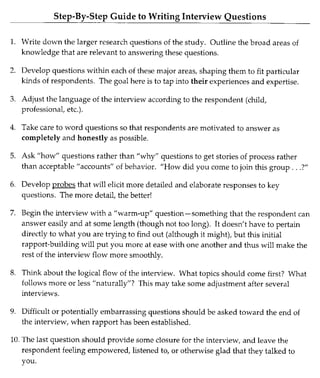
Step by guide to writing interview questions
- 1. Step-By-Step Guide to Writing Interview Questions 1. Write down the larger research questions of the study. Outline the broad areas of knowledge that are relevant to answering these questions. 2. Develop questions within each of these major areas, shaping them to fit particular kinds of respondents. The goal here is to tap into their experiences and expertise. 3. Adjust the language of the interview according to the respondent (child, professional, etc.). 4. Take care to word questions so that respondents are motivated to answer as completely and honestly as possible. 5. Ask "how" questions rather than "why" questions to get stories of process rather than acceptable "accounts" of behavior. "How did you come to join this group ...?" 6. Develop probes that will elicit more detailed and elaborate responses to key questions. The more detail, the better! 7. Begin the interview with a "warm-up" question-something that the respondent can answer easily and at some length (though not too long). It doesn't have to pertain directly to what you are trying to find out (although it might), but this initial rapport-building will put you more at ease with one another and thus will make the rest of the interview flow more smoothly. 8. Think about the logical flow of the interview. What topics should come first? What follows more or less "naturally"? This may take some adjustment after several interviews. 9. Difficult or potentially embarrassing questions should be asked toward the end of the interview, when rapport has been established. 10. The last question should provide some closure for the interview, and leave the respondent feeling empowered, listened to, or otherwise glad that they talked to you.